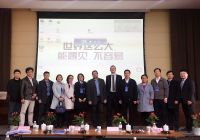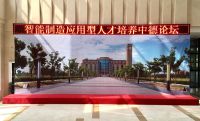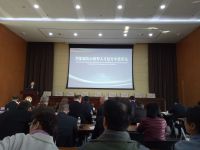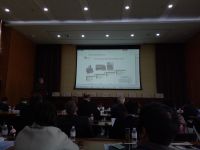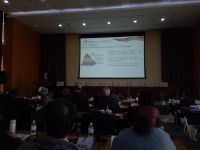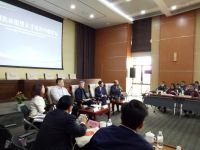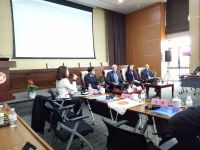Recently, I had the chance to attend the "Chinesisch-Deutsches Symposium zur Ausbildung praxisorientierter Fachkräfte in Intelligenter Produktion" [智能制造应用型人才培养中德论坛], which roughly translates to Chinese-German Symposium on the Education of Practice-Oriented Professionals for Intelligent Production. This symposium took place on March 1st and 2nd, 2017, at the Shanghai Dianji University [上海电机学院] in Shanghai, China. The focus of the symposium was to discuss the requirements imposed by the trend towards a higher degree of automation in the productive industry fueled by concepts such as Industry 4.0 and Made in China 2025 [中国制造2025]. Although I could only attend the first day of this nice meeting, I think I learned a few interesting things on the topics Intelligent Production and Education. Here you can find the (Chinese) press release about our uni's delegation to this meeting.
Here you can find a video about the event.
Intelligent Production and Industry 4.0
The concept of Industry 4.0 is based on the idea of four industrial revolutions: The first one took place when water and steam power became usable and the production became mechanized. During the second revolution, assembly lines and electricity then enabled mass production. The transition to our current "Industry 3.0" took place when computers and programmable machines allowed for a higher flexibility and speed of production. Finally, it is proposed that we are now approaching a fourth revolution towards a production control based on cyber-physical systems and decentralized decisions.
Whether this is actually a revolution or a gradual evolution seems to be controversial among the presenters. I believe all of them agree that, obviously, several companies will remain at industry 1.0, 2.0, or 3.0 level for quite a while and these concepts will co-exist. There won't be a sudden change towards a new world where all companies just employ Industry 4.0, as several speakers mention.
Also I am not sure whether there will be a full implementation of all design principles of Industry 4.0 in the near future. Maybe we will first move away from a top-down production planning approach towards a feedback loop where Enterprise Resource Planning systems simply get more intelligent and permanently update (and optimize) their plans according to status information from production.
I thus like that the title of this symposium uses the term "Intelligent Production" rather than "Industry 4.0", as it also fits to such scenarios. In order to meet the challenges of this new field, we also provide the short course Metaheuristics for Smart Manufacturing.
University Education
Anyway, education for intelligent production was the main theme of the symposium. We can distinguish university education and the training a company provides to its employees. I want to start with what I learned about the former. The presentations mention several requirements for a successful practice-oriented university education.
Focus on Industry Needs
Several speakers emphasize that education in a university of applied sciences should focus on the needs of the industry. This means that it makes sense to conduct surveys or even brain storming sessions with industrial partners to identify these needs. It does not mean to design a curriculum to fit exactly to the needs of a particular, single partner, because each partner is driven by its particular interest. Still, a good consensus of training on particular tools and general education needs to be found – and therefore communication with industry partners is indispensable.
Interdisciplinarity
The need of interdisciplinary education was mentioned several times. Indeed, its popularity is on the rise for several decades already. The requirements posed by intelligent production and automation have certainly further contributed to the importance of interdisciplinarity.
Wide versus Narrow: Interdisciplinary Specialists?
This brings us to another interesting point, mentioned in one of the audience questions. At first glance, there seems to be a contradiction between two demands that the industry poses on practice-oriented education:
- The industry needs highly specialized people.
- The industry wants people who are interdisciplinary.
How can someone have both a narrow specialization and wide knowledge? I believe that is not a contradiction, it just means that strict thinking in terms of disciplines is not such a good idea. For instance, intuitively one may think that an person can only be a specialist in a narrow sub-field of computer science, a specialist in narrow a sub-field of mathematics, or, say, a specialist in a narrow sub-field of chemistry. Why can someone not be a specialist who designs computer programs based on differential equations to simulate chemical processes? This person would have highly interdisciplinary knowledge, as she must fully understand concepts from all the above fields. Yet she can be highly specialized to this particular task, which may take years of training to master.
The question how to implement this in university education is probably quite challenging. One approach for this, I think, could be to design new programs, such as "industrial engineers" who are specialized in an intersection of engineering and economics.
Learning from Software Engineering
In the talk given by Prof. Schell from the Hochschule Kaiserslautern, I heard a very interesting idea: Education for intelligent production and a world full of complex systems can learn a lot from software engineering. In some sense software engineering is the art of designing systems of both enormous complexity and fragility. It gave rise to a lot of useful practices, tools, and fundamental realizations to allow teams to work on evolving projects of huge scale. I am not sure whether Prof. Schell meant this, but learning from software engineering could mean coping with the fact that systems are growing more and more complex and we have to deal with it. Today, a machine is not just a piece of mechanical engineering, it is controlled by software on a small computer which is connected to a network.
Life-Long Learning
The education at a university should not just teach a specific set of skills and basic knowledge. It should enable the students to learn by themselves, to develop an own target, to realize what skills she lacks to achieve this target, and then to acquire these skills in a self-directed way. This is maybe the most important competence one can obtain to work in an ever-changing world.
Company-Provided Training
The talks of the attending company representatives showed very clearly that modern companies are aware that they need to support their employees to achieve this adaptation to changing demands and environments.
Life-Long Learning
While a very important task of a university is to provide students with the ability to continue to learn and grow throughout all of their professional life, the companies need to create the conditions to let that happen. The company should provide support for continued education and good companies, such as those presenting at the meeting, do so.
Initial Training
I remember one industry representative showing how important the initial training in his company is: New employees at Bachelor level may go through nine years of training until they become core staff members. Such a long time says that, although a university can lay a good foundation and produce educated professionals, the final specialization inside the company is very important as well and surely demands for a clearly structured, targeted, and well-designed training program.
Continuous Evaluation
It seems that together with providing a framework for training and continued education, companies also increase their focus on evaluating employees. Data mining and software tools probably made it easier to track the individual development of each member of a companies workforce. Statistics can be used to support an employee in her growth, because they allow us to find the fields where she excels and those where she may need help to improve. Combined with a training program stretched over several years, they can help spotting talented employees who can be placed on a fast track and also to identify the right future specialization area for each team member.
Permeability
Several of the presenting companies point out that permeability is important to develop and retain an excellent workforce. Of course, an employee will only strive for life-long learning and accept continuous statistical evaluation if there is both a perspective for career growth and a chance for new challenges. If a companies asks their employees to be able to keep developing themselves, they must also provide the chance to actually do that. This includes horizontal permeability, i.e., the change of job focus while staying on the same position level, to explore another interesting aspect of the company's operation, and vertical permeability, the chance to be promoted. It may also include the chance to conduct stays abroad.
Incentives
While permeability is one form of incentive, it is only possible to promote a certain fraction of the employees. Other incentives that can be combined with continuous evaluation are bonuses in form of money or company shares. The latter probably additionally increases the loyalty of an employee and creates further attraction to perform well.
Innovation Culture
A company can only grow if it can continuously develop products which are better than those of its competitors in some aspects. One of the most important aspects is clearly the discovery of customer needs and their subsequent resolution in form of new products or features, i.e., innovation. Prof. Gust from the Bergische Universität Wuppertal pointed out that only one in seven ideas leads to success. A company thus needs an innovation process management, innovation culture, and innovation portfolio management as well as a constant rejuvenation of its knowledge via external learning.
Knowledge Transfer over Generations
Another point mentioned by Prof. Gust is the knowledge transfer from older employees (who will eventually retire) to their successor generation. Especially in small and mid-sized companies, the retirement of an important expert may cause severe problems. It makes thus sense to prepare for such a (predictable) event early on by having the seasoned expert working closely with her successor.
Summarizing Thoughts
Interestingly, I think I did not hear a single education requirement which is newly caused by the drive towards intelligent production. All of the above concepts clearly existed long before, e.g., Industry 4.0 was even conceived. The fact that they were emphasized in this meeting may have, I believe, the following causes:
- Teachers both in universities and companies have been researching for better ways to teach and how to help their students to a long and successful career path. This work now comes to full fruition.
- Some concepts (such as complex statistical evaluation and emphasis on self-directed learning) have become easier to implement and thus more widely accepted with better (software) tool support and the ubiquitous availability of the internet and computers.
- The advent of computer support in virtually every single aspect of our life and every single aspect of production created the situation where any non-computer scientist must have a certain share of computer knowledge to work efficiently. It is basically not feasible anymore to be "traditional" engineer without knowledge of various software packages. Thus, interdisciplinarity is always there.
- Our world is currently changing so fast that life-long learning is not an optional philosophical goal anymore. If a trained professional is not able to practically replace 90% of her working knowledge with updated information every ten or so years, she cannot succeed in the environment of a global company.
- Higher automation of (intelligent) production, the networking of machines and products, and computer programs making decisions that previously only a person could make, together, reduce the amount of people needed in the workforce.
I think that intelligent production is not what triggers the need for the education goals listed in this article. It is one of several aspects (such as the rise of the internet, of smart phones, and globalization) that increase pressure and pain to such a degree that the corresponding techniques have very significantly risen in importance.


